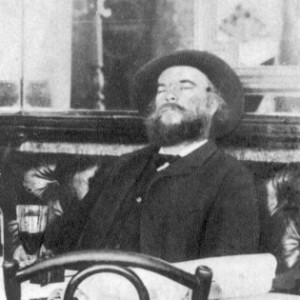Above all, music. My advice :
go for the odd, the undefined;
leave the pompous pose behind.
No need to be complex, precise.
In shades of gray compose a song
where certainty and wonder fuse.
Remember: if you always choose
your words with care, you can’t go wrong.
It’s veils that hint of brilliant eyes;
it’s bold days quivering at noon;
resplendent constellations strewn
pell-mell across cool Autumn skies!
Seek subtlety! The poem shorn
of gaudy, multicolored threads
is what you need; for nuance weds
dream to dream and flute to horn!
Avoid the greasy spoon: the cheap,
acerbic barb of cruel wit,
the chortle that delivers it
and makes the gentle heavens weep!
Then throttle eloquence! Beware
or you’ll resort to reckless rhyme;
sober it up from time to time,
for it may lead to who knows where.
O, who’s to blame for rhyme-gone-wild,
this flimsy trinket made of paste?
The crazy fool who writes in haste
these hollow lines? The tone-deaf child?
It’s music now and evermore!
Like errant souls that always ache
for clement skies, new hearts to break,
may all your verses sail and soar!
And may your verses dare to lift,
cast to the morning’s restless wind
that scents the air with thyme and mint . . .
and “literature” is all that’s left.
 Paul-Marie Verlaine (30 March 1844 – 8 January 1896) was a French poet associated with the Symbolist movement. He is considered one of the greatest representatives of the fin de siècle in international and French poetry. His poetry was admired and recognized as ground-breaking, and served as a source of inspiration to composers. Gabriel Fauré composed many mélodies, such as the song cycles Cinq mélodies “de Venise” and La bonne chanson, which were settings of Verlaine’s poems. Claude Debussy set to music Clair de lune and six of the Fêtes galantes poems, forming part of the mélodie collection known as the Recueil Vasnier. Reynaldo Hahn set several of Verlaine’s poems as did the Belgian-British composer Poldowski (daughter of Henryk Wieniawski). From Wikipedia.
Paul-Marie Verlaine (30 March 1844 – 8 January 1896) was a French poet associated with the Symbolist movement. He is considered one of the greatest representatives of the fin de siècle in international and French poetry. His poetry was admired and recognized as ground-breaking, and served as a source of inspiration to composers. Gabriel Fauré composed many mélodies, such as the song cycles Cinq mélodies “de Venise” and La bonne chanson, which were settings of Verlaine’s poems. Claude Debussy set to music Clair de lune and six of the Fêtes galantes poems, forming part of the mélodie collection known as the Recueil Vasnier. Reynaldo Hahn set several of Verlaine’s poems as did the Belgian-British composer Poldowski (daughter of Henryk Wieniawski). From Wikipedia.
 Catherine Chandler is a Canadian/American poet & translator. She is the author of The Frangible Hour, which won the 2016 Richard Wilbur Award (forthcoming, University of Evansville Press); Lines of Flight (Able Muse Press), shortlisted for the Poets' Prize; Glad and Sorry Seasons (Biblioasis); and This Sweet Order (White Violet Press). Her complete bio, audio podcasts, and reviews are available on her poetry blog,
Catherine Chandler is a Canadian/American poet & translator. She is the author of The Frangible Hour, which won the 2016 Richard Wilbur Award (forthcoming, University of Evansville Press); Lines of Flight (Able Muse Press), shortlisted for the Poets' Prize; Glad and Sorry Seasons (Biblioasis); and This Sweet Order (White Violet Press). Her complete bio, audio podcasts, and reviews are available on her poetry blog,